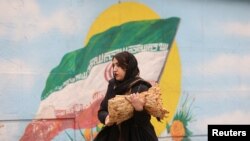Protesters in Iran held a second day of a three-day strike as part of a wave of civil unrest triggered by the September death of an Iranian Kurdish woman who had been detained by the country's morality police.
The protesters had called for shop owners to close their businesses through Wednesday in order to bring about government reform. Witnesses said large numbers of businesses were shut down across the country on Tuesday.
VOA's Persian service reported market closures in at least 80 cities, including Tehran, Shiraz, Isfahan, Yazd, Ilam, Mashhad and Karaj.
Iran's judiciary chief, Gholamhossein Mohseni-Ejei, ordered the arrest of anyone encouraging shopkeepers to close their businesses.
The strike comes as confusion swirls over the status of Iran's morality police, which enforces strict codes on women's dress.
The semi-official news agency ISNA quoted Iran's chief prosecutor, Mohammad Jafar Montazeri, in a Saturday report as saying the morality police "had been closed."
Activists, however, voiced doubt that such actions were being taken. By late Sunday, state outlet Al-Alam issued a report saying the judiciary in which Montazeri belongs does not oversee the morality police.
Government officials have not publicly commented on the matter.
The Associated Press reports that fewer morality police officers have been seen in Iranian cities in recent weeks and says it has become more common to see women walking on the streets without wearing a hijab.
Iran's anti-government demonstrations began after 22-year-old Mahsa Amini was detained by the morality police for not wearing her hijab properly. Her death in police custody led to a wave of protests, during which rights groups say at least 471 people have been killed.
Some information in this report came from The Associated Press, Reuters and Agence France-Presse.





